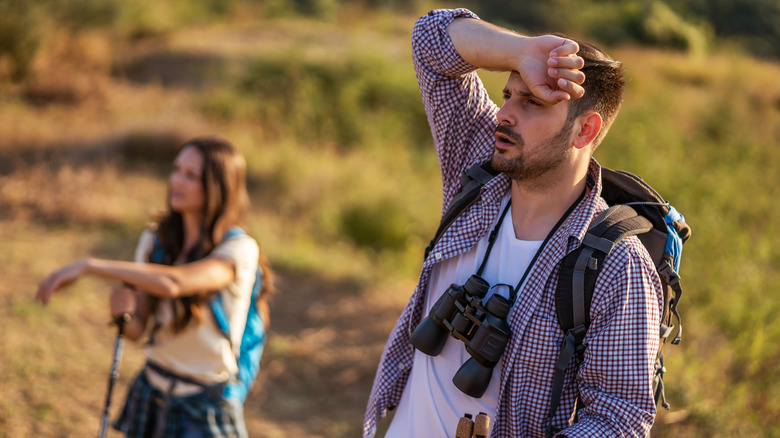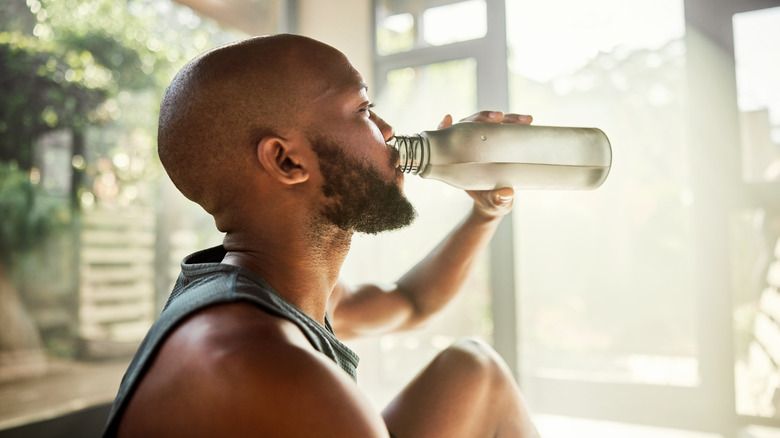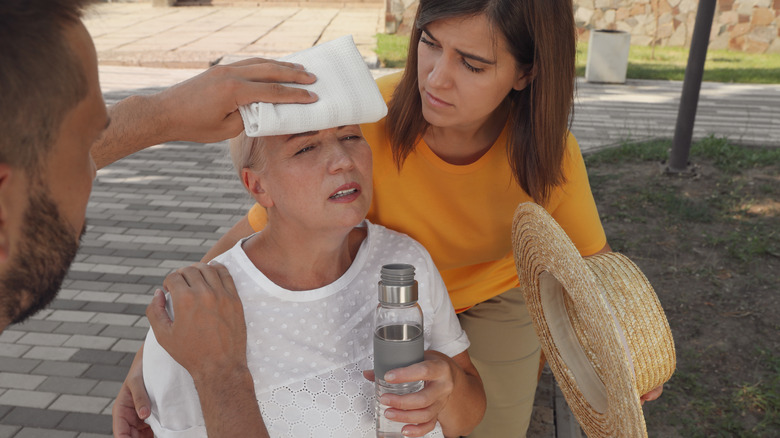The Best Ways To Avoid Heat Stroke While Doing Outdoor Activities
Summer is here and a lot of the country is dealing with heat waves. When it's warm and sunny, of course we want to get outdoors for a hike, baseball game, or long walk. However, when it gets too hot or we're expending too much energy, sometimes our bodies can't adjust. That can lead to common heat-related illnesses like heat exhaustion or heat stroke.
According to the Centers for Disease Control (CDC), heat exhaustion happens when we sweat to the point where we lose too much water and salt. It can be worse if you're older, working outside, or have high blood pressure. Symptoms can include a headache, nausea, thirst, dizziness, weakness, elevated body temperature, irritability, and decreased urine output. Heat stroke is more serious, and it happens when your body can't control its own temperature, potentially causing permanent disability or death without treatment. With heat stroke, you may be confused, slur your speech, or even pass out. Your skin will be hot and dry, or in contrast, you may sweat excessively. Your body can hit temperatures of 106 degrees Fahrenheit quickly, and you may even have a seizure.
These are not conditions to take lightly. Being outside in the summer is a wonderful thing, but a bit of prevention and knowing what to do if you end up getting sick from the heat can save your life. Here's how to prevent heat-related illness and what to do if it happens.
How to prevent heat exhaustion and heat stroke
Preventing heat-related illnesses can save your life. The CDC recommends wearing loose, lightweight clothing, which can help keep you cooler. (Dark colors absorb light while light colors reflect it.) If you're outdoors, know the closest spot with air conditioning, like a library, restaurant, or store. Schedule your outdoor activities in the early morning or later in the evening so you're not in direct sunlight. If you're not used to exercising in the heat, start slow and work gradually. Lighter meals can help as well.
It's crucial to carry water if you're going to be away from civilization, like at a national park in the summer or out camping. It's even important to hydrate when you're around water, like at the beach or a pool. Don't wait until you feel thirsty to drink. Skip that beer and alcohol in general, as well as very sugary beverages. Ice-cold drinks can cause stomach cramps, so go for cool ones instead. Sports drinks can help replace salt and minerals that are lost through your sweat. You can even carry packets of electrolyte powder to put into water.
If there is a heat alert outside, skip the activity and wait for it to get cooler. Keep an eye on your friends and companions. If you see signs of illness or exhaustion, get them help immediately. Keep in mind that some medications (diuretics, some antidepressants, and others you can read about here) can make heat-related illnesses worse.
What to do if you get heat exhaustion or heat stroke
As soon as you start feeling "off" or have any of the symptoms we described, get to a cool place as soon as possible. Even shade is better than direct sunlight. Cool (not ice cold) liquids should be consumed, and you (or whomever is affected) should take off any unnecessary clothing/shoes. Cold compresses can help as well. It's worth going to a doctor or clinic, or calling 911 if needed.
If you or someone else starts slurring, begins to faint, or has seizures, or if sweating stops, call 911 immediately. Do not wait. All of the above tips from the CDC should still be followed. If you have access, a cold water or ice bath is recommended, as is wetting the skin and putting wet cloths on the person. You can also wet their clothing. Ice on the neck, armpits, and groin can help.
If you're going to be doing an activity outdoors in the heat, make sure you have cell phone or Wi-Fi access and know your location to direct emergency services. If you're away from civilization on a hike or camping (and especially if you're doing a solo hike), make sure someone always knows where you are. Look up how cell service generally is in the area, and if it's bad, bring a satellite phone and satellite GPS so you can call in an emergency. (They can often be rented.) Stay safe out there.


